Tutorials
Monday 12th June 2023
euspen’s 2023 extensive tutorial programme will cover a range of key topics for the precision engineer
Whilst covering a clear technical curriculum, tutorials are less formal than a lecture; providing more personalised learning in a social atmosphere.
They incorporate existing challenges in the workplace which cover conceptual theories through to best practice applications.
These tutorials will take place on Monday 12th June 2023.
Tutorial 1: FUNdaMENTALs of Precision Design
Monday 12th June 2023
Room: S06
Time: 08:30 – 11:30
The tutor is Prof. Alex Slocum, MIT, US
This tutorial provides a fast-paced hands-on introduction to rapid precision machine design based on FUNdaMENTAL principles including theory and best practices. Topics include: initial error allocation to enable rapid design, principles of accuracy, repeatability and resolution, bearings, structures, and actuators. Kinematic and elastic averaging-based designs and the implications for bearing life and dynamic performance are stressed with F=kx and w = sqrt(k/m) as recurring themes throughout the design of a machine. Examples will be presented to show how FUNdaMENTAL principles are critically important for an engineer to understand in order to be able to most effectively use modern design tools such as solid modelling and finite element analysis in the design of precision machines.
Learning outcomes:
Attendees should expect to leave with new design tools (spreadsheets) they feel comfortable applying and a host of new design ideas for selecting and integrating bearings structures and actuators in precision machines.
Intended audience:
This tutorial should be helpful for those at the beginning of their careers and also for those who wish to tune up their design approach with linking design approaches with first order analysis to develop designs more rapidly and to check output from FEA.
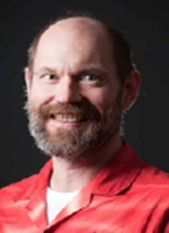
Alexander Slocum is the Walter M. May and A. Hazel May Professor of Mechanical Engineering at MIT, a Fellow of ASPE and ASME, and a member of the National Academy of Engineering. He has 145+ patents and has helped develop 11 products that have received R&D 100 awards for “one of the one hundred best new technical products of the year”. He pioneered the deterministic design of kinematic couplings (www.kinematic couplings.org) including the standard for all semiconductor wafer transport carriers (SEMI E57-1296). He has helped start several successful precision manufacturing equipment companies and has a passion for working with industry to solve real problems and identify fundamental research topics.
Tutorial 2: Modern micromachining and texturing approaches – Electrochemical and laser micromachining: Fundamentals to applications
Monday 12th June 2023
Room: TBC
Time: 08:30 – 11:30
The tutors are Dr. ir. Krishna Kumar Saxena and Dr. ir. Balasubramanian Nagarajan, KU Leuven, BE
KU Leuven has a long-standing history in the field of EDM/ECM/laser-based manufacturing processes. In this course the fundamentals of two modern micromachining technologies namely micro-ECM and ultrashort pulse (USP) laser processing will be discussed. This tutorial will start with the review of the state of the art and the material removal mechanisms with micro-ECM and USP laser processing on different material classes ranging from metals to conductive-ceramics. The tutorial will also cover advanced developments in micro-ECM and laser micromachining carried out during past and ongoing projects at KU Leuven, specifically in process-monitoring, advanced sensing approaches, surface texturing strategies, on-machine metrology and process hybridization.
Advanced applications will be introduced such as machining of cermets and superalloys, fabrication of complex features and surface textures intended for several components including microelectronic devices, dental implants and injection moulds for high aspect ratio microneedles. The tutorial will also address the limitations of these technologies, and, finally, touch upon the possibilities of developing digital twins and advanced process sensing for micro-ECM and laser micromachining.
Topics covered:
- Fundamental principles of micro-ECM and ultrashort pulse (USP) laser processing
- Material removal mechanisms on different material classes ranging from metals to conductive cermets
- Advancements in processing capabilities and new materials
- Process-monitoring and advanced sensing technologies
- Applications: Micromachining of advanced materials and surface texturing
- Hybrid ECM processes
- Towards the development of digital twins for non-conventional micromachining technologies
Learning outcomes:
The course covers the basics of micro-ECM and laser micromachining, from fundamentals to process monitoring and applications. It offers the participants a deeper scientific insight into these processes.
Intended audience:
Graduates, postgraduate engineers, post-doctoral researchers, micromachining enthusiasts plus industry technical staff working in micromachining. Interdisciplinary engineers keen to learn micromachining are welcome as well.
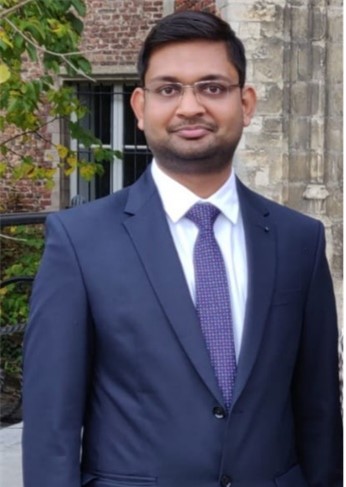
Dr ir. Krishna Saxena is a FWO post-doctoral research fellow at Department of Mechanical Engineering at KU Leuven, Belgium working in the group of Prof. Dominiek Reynaerts. Prior to this position, he completed his PhD in advanced micromachining at KU Leuven, Belgium entitled “Hybrid laser-electrochemical micromachining technology: Machine design and process analysis by simulation and experiments”. His research has been sponsored by two European projects: European Marie Curie ITN H2020 project ‘MICROMAN’ and EU Factories of Future project ‘PROSURF’. Prior to this, he received his mechanical engineering bachelors degree in 2013 and materials engineering masters degree (Indian Institute of Technology Gandhinagar) in 2015, both from India. He carried out his master thesis research at IFU, University of Stuttgart, Germany (2016) and also worked as a researcher at Department of Mechanical Engineering, University of Auckland, New Zealand (2015). His research activities are in micromanufacturing processes mainly micro-ECM, hybrid laser-ECM and micro-EDM processes. He has been supervising more than 12 master students and coaching 2 PhD researchers. Krishna has published 25+ journal papers and 2 book chapters, and presented his work at 20+ conferences. He is an active presenter in euspen, INSECT, WCMNM and CIRP ISEM conferences.
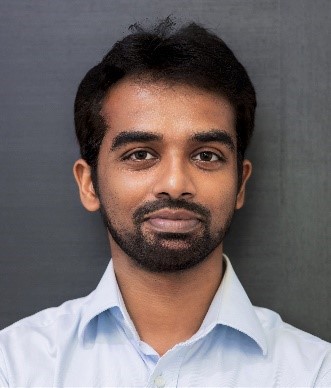
Dr. ir. Balasubramanian Nagarajan is a post-doctoral fellow at the Department of Mechanical Engineering, KU Leuven in the laser micromanufacturing group of Prof. Sylvie Castagne. He obtained his M.Sc and Ph.D. in Manufacturing from Nanyang Technological University (NTU), Singapore, in 2010 and 2015, respectively. After his Ph.D., he worked as a Research Fellow at Rolls-Royce@NTU Corporate Lab on the surface enhancement techniques for aerospace components. He joined Singapore Institute of Manufacturing Technology (SIMTECH-A*STAR) in 2017 as a Research Fellow/Scientist-I to design and develop hybrid laser-based 3D additive manufacturing systems. He has 12 years of experience in manufacturing processes with primary research interest in laser material processing, surface enhancement and micromanufacturing. He has worked with various industrial (Rolls-Royce, Philips, Applied Materials) and academic partners in the field of Manufacturing. He has authored more than 20 peer-reviewed publications and presented at various international conferences. He is a co-applicant of a patent with Rolls-Royce Plc. He has been a reviewer for several high-impact factor journals in the fields of manufacturing and surface engineering. His current research focus is exploiting the femtosecond laser micromachining and surface texturing for several applications including medical devices, cutting tools, and microelectronics.
Tutorial 3: 2D and 3D Roughness Measurements for Engineers & Scientists
Monday 12th June 2023
Room: TBC
Time: 08:30 – 11:30
The tutor is Dr.-Ing. Marvin Groeb, Kern Microtechnik GmbH, DE
The tutorial gives a general overview of 2D and 3D roughness measurement techniques and devices. The advantages and limitations of tactile and optical profilers are discussed. The evaluation of 2D roughness parameters such as Ra, Rz (ISO 4278, 21920) but also the more novel areal surface parameters Sa, Sq (ISO 25178) is discussed at length, showing the common mistakes. Moreover, the advanced surface parameters (Smr, Str, Spd…) to quantify surface structures are explored in depth.
Real world sample data for turned, ground, milled and lasered surfaces show the best practice to achieve repeatable and correct standards.
Learning outcomes:
- Choosing the correct measurement devices and methods
- ISO 4278 and ISO 25178, ISO 21920
- Troubles, Pitfalls, and easy mistakes when evaluating surface roughness
- Best practice for industrial engineers
Intended audience:
This tutorial is aimed at both industrial engineers, manufacturing specialist and researchers that work with roughness measurements.
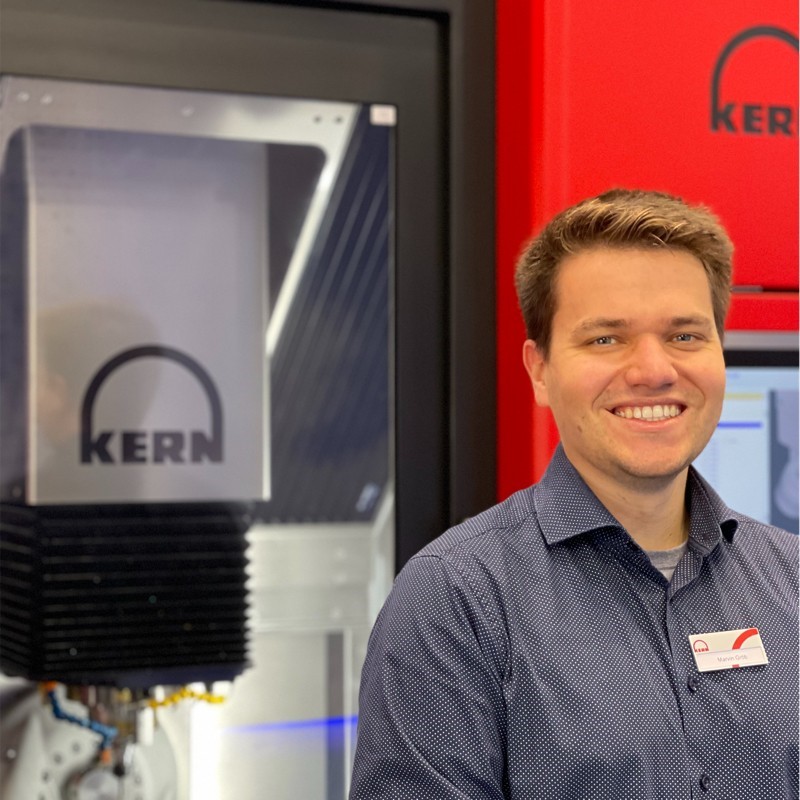
Dr.-Ing. Marvin Groeb is the Head of Future Applications at Kern Microtechnik GmbH, Germany. His formal education is a M.Sc. in materials science and a PhD in material analytics from the Technical University of Darmstadt, Germany. After a Postdoc Year in Switzerland focusing on Diamond Turning and Optical Metrology; he is now a senior researcher in subtractive manufacturing and surface topography enthusiast. Marvin’s research interests are micro-milling, ductile milling of hard and brittle materials but also the superfinishing of non-ferrous, ferrous and ceramic materials. The constant stretch between industry tolerance requirements on surface finishes and the different approach the academic world takes, has led Marvin to deep dive into optical and tactile measurements of surface roughness.
Tutorial 4: Machine Metrology Taster
Monday 12th June 2023
Room: TBC
Time: 10:00 – 12:00
The tutor is Prof. Andrew Longstaff, University of Huddersfield, UK
Huddersfield University has been involved in fundamental and applied research into modelling and correcting the errors in manufacturing machines since the early 1990s. This tutorial is delivered from a research group that was founded by experts from the machine tool industry and grew to encompass industrial robots and metrology instruments and the synergies (and conflicts) between them.
The interactive tutorial will cover the two key topics of metrology FOR machines and metrology ON machines. It will raise a number of questions, answer some of them and spark a conversation on the future of this vital topic in future precision manufacturing. Throughout the tutorial there will be reference to relevant ISO standards and how these play a role in establishing common ground, even where deviation from the letter of the standards is needed.
Topics covered:
- Fundamental principles of errors in manufacturing machines: the need for metrology
- Methods of measurement and sources of uncertainty: the good, the bad and the practical compromises
- Machine errors: avoid, compensate or correct?
- The pitfalls and opportunities for metrology on machines that were intended for machining
- The future: digital tools as part of “metrology” to support traditional measurement
Learning outcomes:
This tutorial is designed for researchers and practitioners interested in machine measurement and the use of machines for measurement. One of the main outcomes is to establish a common language when discussing machine accuracy between builders, suppliers, end-users and those researching solutions to the myriad problems. You will get an overview of the problem and suggestions on how to go deeper into each of the topics.
Intended audience:
The community of researchers and practitioners working with manufacturing machines with a need for controlling accuracy. This includes graduates, postgraduate engineers, post-doctoral researchers, manufacturing engineers and those involved in procurement of manufacturing machines.
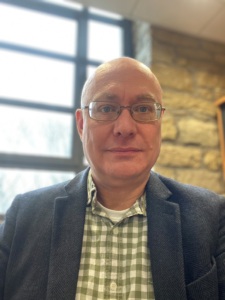
Andrew Longstaff is Professor of Machine Tool Metrology and Research Director within one of the leading research centres at the University of Huddersfield, UK. Since 1995, his research focus has been on measurement, reduction and compensation of the effects of errors in manufacturing machines. As well as working on high-end measurement

